 ,
,
Consider a social dilemma where public-goods contributions are complements. This corresponds to Evolutionary Stability, Co-operation and Hamilton's
Rule
, Ingela Alger and Jörgen Weibull, section 3.1.2.
Let player strategies x, y be strategy profiles in X, the set of strategies in a symmetric personal-fitness game G = (X, π) fully defined in sec. 2.1 of the paper. Let behaviour rules φ, ψ be functions of φ : X → X assigning a non-empty subset of the strategy space as a response to the other player's strategy.
Lastly, let the difference in fitness be
,
where x is the incumbent strategy, y is the mutant strategy, and π is weighted personal fitness.
Consider the multiplicative contribution case,
Fixing τ = 0.5 (strategic substitutes), relatedness r = 0.5, cost c = 1, this produces the following static plots of function H over intervals of x and y.
Full-size | eps
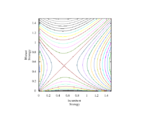
Full-size | eps

Full-size | eps
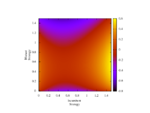
Fixing cost c = 1 and relatedness r = 0.5, fluctuate τ monotonically-increasing over [0, 1] when τ = 1.0 (strategic independence).
Full-size
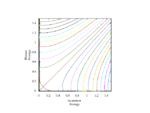
Full-size

Full-size
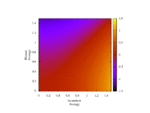
Fixing cost c = 1 and τ = 0.5 (strategic substitutes), fluctuate r monotonically-increasing over [0, 1].
Full-size
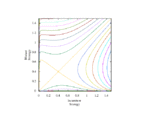
Full-size

Full-size
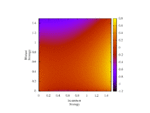
← Back to index. Kristaps Dzonsons, $Date: 2011/02/02 16:45:43 $